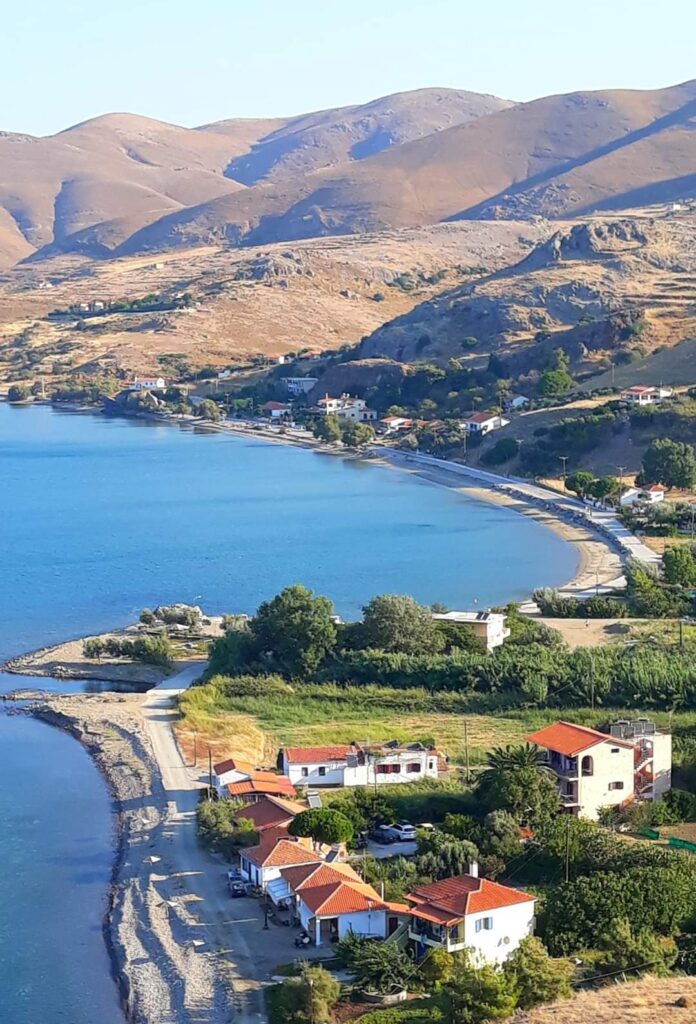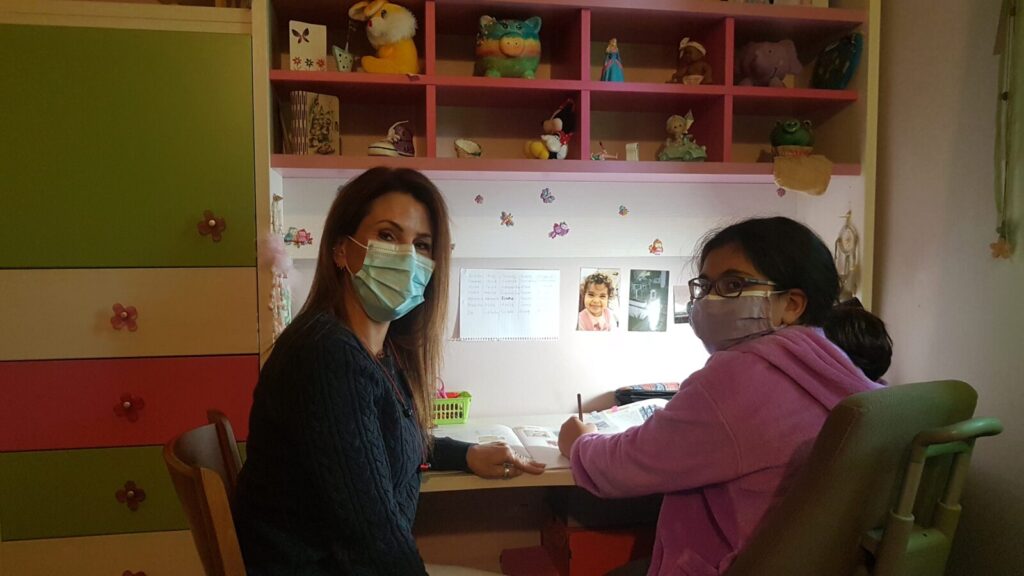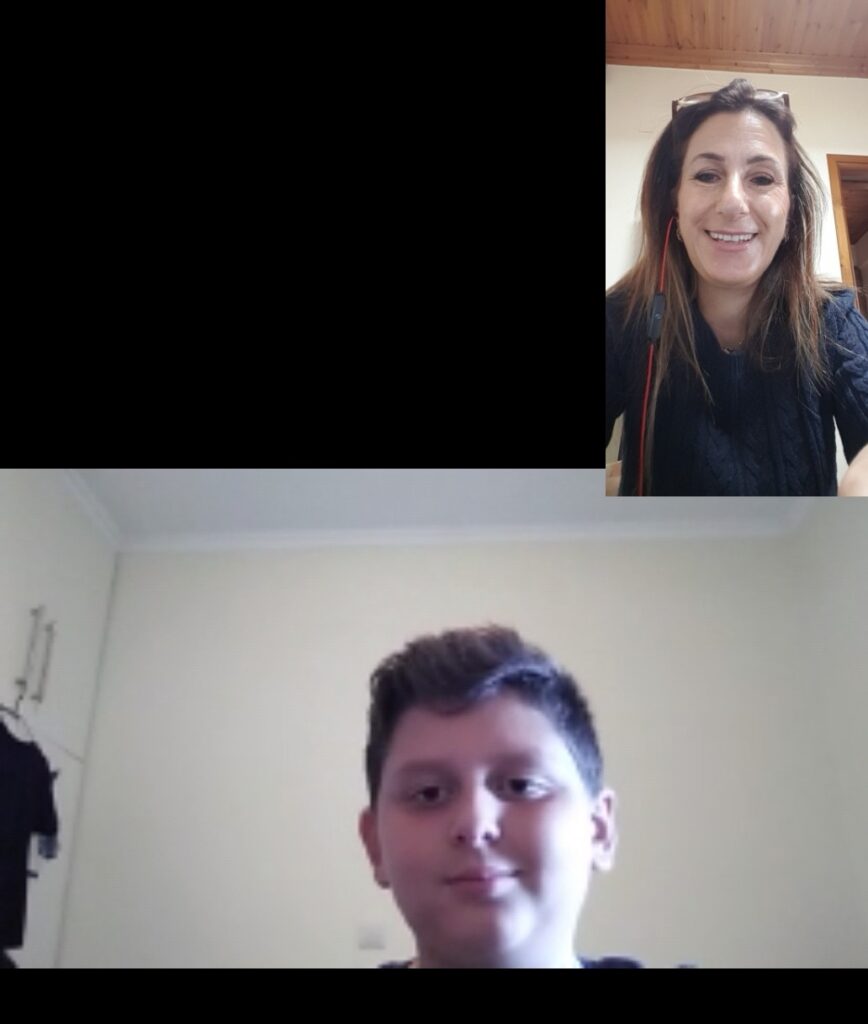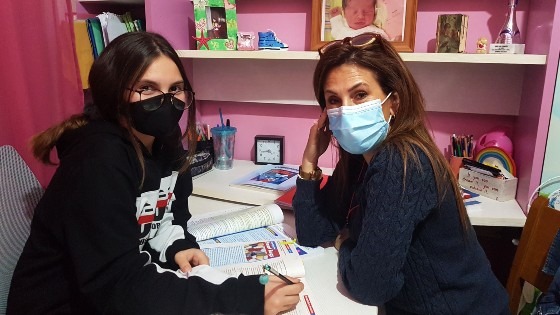After earning a degree in computer programming, Bridge student and South African EFL teacher, Sophia Chatzoglou, gravitated toward teaching, staying on as an instructor at the same college she attended. Later, when she moved to the island of Lemnos in Greece, she combined her expertise in teaching and love of the English language to switch careers and become a freelance English tutor for kids and adults. We interviewed her on what it’s like being a private tutor in a small community and how she has modified her teaching methods to adapt to the current global pandemic.
Hi Sophia! Can you tell us a bit about yourself?
I live in Greece, on an island in the northern Aegean called Lemnos with approximately 17,000 inhabitants. I am a mother of two children in their 20s, and I have been teaching English as a second language for 10 years. I was born and raised in South Africa and emigrated to Greece in 1994 and I have been living in Lemnos ever since.
I have a diploma in computer programming and when I finished my course in South Africa, I was asked to stay on at the college to teach software programming, so one could say that I have always been involved with teaching, one way or another. I taught at the college for five years and then emigrated to Greece.
Why did you choose to emigrate to Greece?
Firstly, the reason why I emigrated to Greece was due to the political instabilities during the 1990s in South Africa. Therefore, I decided to emigrate to a safer place and having a house in Lemnos Greece was my most obvious choice. I do miss South Africa, but I have not regretted emigrating to Greece.

The island of Lemnos in Greece
What is Lemnos, the place where you live, like?
Lemnos is situated in the Northern Aegean and has around 17,000 inhabitants. It is the eighth largest island in Greece and its capital is called Myrina. Because of its location in the northern Aegean, it is of great military importance, having both a military air force base and army bases throughout the island.
Lemnos has a vast and rich history harboring the oldest human settlements in the Aegean and possibly the first and organized settlement. It also has many ancient ruins, which are tourist attractions today. In some of the accompanying pictures, you will see that we have an ancient castle. It is situated in the capital and was built in 1186 A.D. as a fort and was completed between 1207 and 1214 A.D. It is also a tourist attraction today.
Today, Lemnos has 33 villages and concentrates mainly on agricultural activities. It also is known for its excellent collection of wines, honey, and cheese with many international awards.

A view of Myrina Castle in Lemnos
How did you get into the English teaching field?
While I was raising my children, I did not work and was a stay-at-home mom. As for their English education, I was obviously involved with that and that is how my English tutoring began.
I started helping out my nephews and niece with their English and from there on I realized I could do something with this. I have always been a grammar “junkie” and having read as much as I could on grammar rules, I decided to take on students other than my relatives. I also sat for proficiency certification from American and British universities.

Sophia teaching English at her student’s home
How have you built your client base as a private English tutor?
Living on an island, the community is small, so I didn’t have to advertise myself and basically acquired my students through word of mouth.
Generally, parents opted for my teaching services because of my accent and good knowledge of English and that the students will acquire as close to a good English accent as possible. In addition, some parents prefer a private tutor over sending their children to an English class with many students.
Check out these 10 ways to attract more students as a freelance online English teacher.
How strong is the EFL market in Greece?
There is quite a large number of tutors and private institutions that teach English as a second language here in Greece generally, as it is almost considered a second language.
What do you like the most about teaching English on a small island?
I like teaching English here in Lemnos is because the community is small and friendly. Also, I don’t have to travel very far for my lessons.
What are some of the challenges and rewards of working as a private English tutor in Greece?
As for challenges in teaching English, one challenge is teaching adolescent students. Some students, unfortunately, lose interest in English and think of it as an unnecessary “evil.” Here is where the teacher’s patience, understanding, and perseverance come in. Another challenge is the weather conditions here, as winter can sometimes get harsh, and going from one student’s house to another can pose a bit of a problem.
Nonetheless, one of the best things and rewards for the hard work I’ve put in over the years is the students’ gratification and appreciation of having passed the exams they participate in to acquire a certificate of proof for their English knowledge (and not to mention the parents’).

A stone-paved alley in Lemnos
Can you tell us more about your teaching job?
I work as a private tutor and mainly my lessons are one-on-one. The lessons are done at home, in the comfort of students’ rooms, and obviously in the afternoon. I work basically from 2 p.m. until 9 p.m., from Monday to Saturday. My students range from seven-year-olds right up to adults, but most of them are students who are in school.
I have very few groups of students and if there are, I try to keep the number of learners in each class to a minimum of two.
Explore the differences between one-on-one and group English classes.

Sophia teaching English to a small group class online
How has the COVID-19 crisis affected you as an English teacher?
The pandemic has definitely changed the world we live in and how we function as well. Going to an onsite class was once the norm, then we were forced to rise to the challenge and do things differently.
Shifting online
Fortunately, most of my students either had a laptop or some sort of technology to go on with the lessons through the means of the Internet. As I had quite a few students sitting for their first proficiency certificates in a few months, I definitely could not stop the lessons. Therefore, most of my students carried on through online tutoring, while others had to just carry on studying vocabulary at home so as not to miss the level of class completely. Needless to say, some students have preferred this method of tutoring and we are using online tutoring to this day.
Continuing in-person classes
Luckily, living on an island means that somehow, we are a smaller community than the big cities and I can carry on with some of my lessons in person. Naturally, if the situation gets worse, we will have to stop onsite lessons but that does not mean that lessons will stop— we will just carry on through online methods.
Discovering advantages
Having lessons online definitely had some advantages, as I could put some of my students into groups and, in turn, make the lesson much more interesting for them through their sharing of the lesson. Also, students had more participation in the lesson and practice in their SST (the Standard Speaking Test, which is an interview test for a global assessment of language speaking ability). It generally was an advantage all around. The only difficulty was having lessons with my junior students, A1 learners, and students who are weaker than the rest of the students. But when there is a will, there is a way.

Sophia teaching a young student online
You earned the Bridge Master TEFL/TESOL Certificate. Why did you decide to take this course?
The reason why I decided to get a TEFL/TESOL certificate was to broaden my knowledge of teaching, acquire some ideas, and, most importantly, to have a validation of my knowledge in teaching English as a second language other than being a South African. I got to know about Bridge through a friend of mine who had also acquired a TEFL/TESOL certificate through them. My only regret is that I had not done this a lot sooner! I really enjoyed my course and I have asked for an extension so that I can do a few more courses, as I have seen a few that interest me.
All in all, the course has been a very positive experience and I recommend it to anyone who has a love for teaching.

Sunset in Lemnos, Greece
What are your future career plans?
My future plan is to continue teaching English for as long as I can because I really love teaching. I always wanted to be a teacher—especially a grammar teacher but I was too shy to actually make it come true when I was younger.










